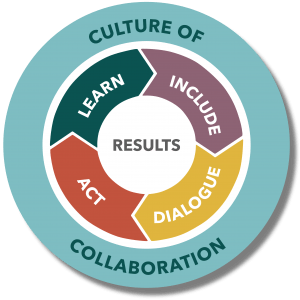Taking a New Approach to Old Resolutions
“Don’t you just love New Years? You get to start all over. Everyone gets a second chance.” – Lenora, Forrest Gump
Too often, New Year’s resolutions focus on what an individual can do, and the result is either success or failure. This means I’m terrible at making New Year resolutions. Each year around this time, I tend to reflect on how I can better get my sh*t together at work based on the previous year’s learnings. This year, instead of putting it all on me, I thought about resolutions that rely on community. I paid a visit to the Canopy’s Community Learning Model (CLM) and its centering on Results. When we use this model in action, we ask groups “What is the Result you seek?” – or some variation of this. So, there I was attempting to block out the noise from the predictable unfoldings of holiday movies playing in the background of my parent’s house asking myself “What is the Result I seek in 2022?” Hot off a fresh diagnosis of Attention-Deficit / Hyperactivity Disorder (ADHD), I started forming a loose Result of “Get it together at work while honoring my neurodiverse superpower.”
In the CLM, a ring identifies four areas that support a Result being pursued – Learn, Act, Dialogue, and Include. To help get a sense of how to “get it together at work while honoring my neurodiverse superpower,” I moved my way through these four areas and visualized what they could look like. Here’s what rose to the top:
Learn
I figured out how to successfully navigate 20ish years of school and hold multiple jobs without a diagnosis. Therefore, there are things I have learned to do that can continue to be helpful. I do want to learn more about how ADHD impacts the brain and executive functioning and where I think this may have posed challenges in the past. There are books, podcasts, blogs, social media influencers, etc. I can learn from it, as well. If I can get a better sense of its impact, I can move closer toward the Result I seek.
Act
As I learn more about how my brain works in comparison to other brains, I can Act by trying out new tools, ways of showing up and checking in with mental health professionals about relevant changes. I can also connect with other folks with similar brains to start building a personal and professional community to buoy me as I re-learn how to navigate different areas of my life. If I can create a personalized toolkit with what works for me, I can move even closer toward my Result.
Dialogue
Reflecting on Dialogue with friends and meetings with colleagues over the years provided a space to ask myself some tough questions. Why don’t I remember that important thing about my best friend? At what point is it no longer funny to say, “my memory sucks?” Why can’t I remember what happened in that meeting? The phrase “the lights are on, but no one is home” had never felt so relevant. If it weren’t for notes, recordings, and patience from loved ones and colleagues, I’d be a compass without a North. Dialoguing with a health care professional about these noticings opened ideas for different plans of action and has already moved me closer to my Result.
Include
Who do I need to Include to get to my Result? So far, I’ve included close friends, my partner and immediate family, and health and mental health professionals. It might be helpful to Include my colleagues at the Canopy, so they know they have a neurodiverse superhero on their team. Including them might also open opportunities to better support neurodiverse folks in the larger Canopy network.
So here I am, writing about how I geeked out and applied a Canopy tool to a personal matter during time off. Geeking out aside, I’m eager to move into this new year – this “second chance” – with a Result I’m seeking. The lights are on and I’m home.
———
In this new calendar year, I invite you to think about the Results you seek in the places you live, work, play, worship, and recreate. I invite you to visualize how to Learn, Act, Dialogue, and Include to create a ring of support around your Result. I invite you to your second chance.
Special thanks to Center for Health Progress’ Rayna Hetlage for her October 2021 Blog “ADHD and Power” and for opening a door to a conversation about neurodiversity.



